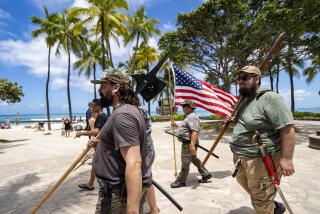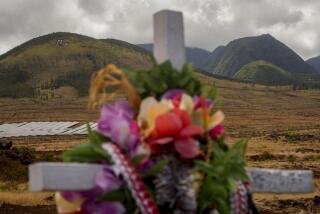Hawaii Slayings Rip Into Cherished Sense of Insulation From Mainland Violence
- Share via
HONOLULU — Lulled by their geographic isolation and a sense of personal security, people in Hawaii have long felt secluded from the violence that plagues other parts of the United States. So when seven Xerox employees were shot dead at their Honolulu office this week, the news came as a horrible jolt.
Living on an island tends to knit people together psychologically, and Hawaiians pride themselves on their feeling of community or ohana (family). Callers have jammed radio talk shows, appalled that such a crime could happen here, and the story has blanketed the newspapers. Because of Hawaii’s web of personal connections, the impact of the bullets has reached far beyond those they felled, and the tragedy has also spawned an unusual degree of self-examination.
“Even though we have almost a million people in Honolulu, we’re still a small town,” said Iwalani White, the city’s top deputy prosecutor. “Everybody’s related to everyone, or knows somebody’s uncle or auntie.” In fact, two of the victims were first cousins. “I don’t think we have a false sense of security,” she said.
Islanders Have Reason to Feel Safe
Mass murder in the workplace is an anomaly wherever it happens. And people in Hawaii do have reason to feel safe. Honolulu had just 1.9 murders and non-negligent manslaughters per 100,000 people last year, compared with 12 in Los Angeles and 43 in Baltimore, according to the FBI’s Uniform Crime Report. There were 17 such crimes last year in Honolulu, which encompasses the island of Oahu, home to nearly 900,000 people.
“We have this notion that it’s hard to be anonymous in Hawaii,” said Jon Matsuoka, professor of social work at the University of Hawaii who specializes in community mental health. “That lack of anonymity is a form of social control. It sort of tempers our behavior. But the fact that this has happened indicates that maybe we aren’t so cohesive as we thought.”
Police and company officials are puzzling over what might have prompted the lethal outburst Tuesday at the Xerox engineering center. Byran Uyesugi, 40, a 15-year company veteran, is accused of carefully aiming his 9-millimeter pistol at seven co-workers in turn, killing them all. He fled in a company van to Honolulu’s forested foothills, where police officers talked him into surrendering after five hours.
Uyesugi, charged with one count of first-degree murder and seven counts of second-degree murder, pleaded not guilty at his arraignment Friday. He was being held on $7-million bail. His lawyer, Jerel Fonseca, said later he was considering a defense of mental incapacity.
Xerox Corp. President and CEO Richard Thoman, who flew to Honolulu to help the victim’s families and fellow employees, dismissed rumors that Uyesugi might have been afraid of being fired. “He was under no threat of loss of his job,” Thoman said. “There was no thought of it, no hint of it.”
The island’s pain and bewilderment are multifaceted.
“This was a double surprise because we’re not used to high levels of violent crime, period, and because he is Japanese American,” said University of Hawaii criminologist Meda Chesney-Lind. Americans of Japanese ancestry make up more than a quarter of Hawaii’s population but accounted for just 7.4% of those arrested for violent crimes in 1997, she said.
The anguish his father, Hiroyuki Uyesugi, felt was evident during the standoff with police. Asked if he wanted to try to talk to his son, the elder Uyesugi looked stricken and blurted out, “No, I want to give him another gun so he can kill himself.” Byran Uyesugi underwent anger management counseling several years ago after kicking an elevator door while on a service call, his father said, but had shown no signs of trouble recently. Byran’s brother, Dennis, helped police persuade him to surrender peacefully.
“He was clearly angry, but we don’t know what about, whether it was real or perceived slights or fears,” said Dr. Alvin Murphy, a staff psychiatrist at the state’s Central Oahu Mental Health Clinic, who does not know the suspect. “I almost have to think that this was some kind of massive chemical breakdown of his inhibitory system.”
“What makes it kind of scary is that any time, at any place, there could be one of these quiet guys piling up rage,” Murphy added. “Until now I think we felt almost like, ‘This is our house, Hawaii, and we’re safe inside this house, but that it’s dangerous out there, in places like L.A.’ ”
The list of victims mirrored Hawaii’s ethnic rainbow, including people of Japanese, Chinese and Filipino descent: Jason Christopher Balatico, 33; Ford Kanehira, 41; Ronald M. Kataoka, 50; Ronald Kawamae, 54; Melvin W.T. Lee, 58; Peter Mark, 46; and John Sakamoto, 36--all of Honolulu.
A reserved figure, Byran Uyesugi raised prized goldfish in tanks in his backyard and also did fine woodworking. He was a member of his high school rifle team, long fascinated with guns. On Tuesday, police removed an arsenal that he kept in a locked safe in the family’s modest home in Nuuanu Valley, bordering downtown Honolulu. According to Sgt. Mark Victor, Uyesugi had 18 registered guns, ranging from pistols to shotguns.
Mass murderers are not stereotypical underclass criminals, Chesney-Lind said. “They tend to be middle class, middle aged, often don’t have any previous criminal history. They are male, single, socially isolated and, on the mainland, they are usually white. In all respects, he fits the mass murderer profile, with the single exception of race.
“I think that he’s part of a very bizarre little national trend that doesn’t track with other crime data. It’s a whole different grid of people who maybe have always existed but in the last few decades have far more access to lethal weaponry and can act on whatever strange impulses they have. In the old days, people would get stressed out and run through the sugar plantation with a cane knife. But it would be hard to kill this number of people.”
Traditionally, in Hawaiian society, raising children was the responsibility, not only of the parents but of the community as a whole, and that notion persists today, at least in lip service. Children growing up in Hawaii address their neighbors and other trusted adults not as “Mr. Kanahele” or “Mrs. Chang” but as “Auntie” and “Uncle,” whether they are actually related or not. In some neighborhoods, families regularly hand mangoes and homemade treats to each other over the backyard fence.
In 1986, legislators even went so far as to codify the “aloha spirit” into law, advising government employees to consider this native Hawaiian philosophy in their daily lives. “Aloha is more than a word of greeting,” the statute declares. “Aloha means mutual regard and affection, and extends warmth in caring with no obligation in return.”
Incident Damages Sense of Refuge
Some mainlanders seek refuge in Hawaii, thinking they’ll get away from social ills and enjoy a simpler, gentler life. But this week’s events have shaken that image.
“It is no longer possible to believe that one can move to an ‘outpost’ and evade the kinds of ‘diseases’ which seem so endemic to more urban areas,” said Pia Stern, an artist who moved from the Bay Area to Honolulu.
Despite Hawaii’s image as a paradise, the state has its share of social problems, Matsuoka said. The islands are becoming more crowded, many people struggle to make a living in an economy that has been flat for nearly a decade and images of violence are daily fare on television. “Although the lifestyle here has the reputation of being kind of laid back, it isn’t necessarily so,” Matsuoka said. “There are a lot of stressed-out people in Hawaii. What happened Tuesday is an extreme example of that.”
Hawaii’s gun laws are among the strictest in the nation. It is the only state that requires registration for all firearms, not just handguns, and it requires those obtaining permits to undergo background checks, a minimum 14-day waiting period and a firearm safety course, according to Brandon Stone, management analyst for the Honolulu chief of police. People who commit violent crimes or who are under restraining orders may be forced to yield their weapons, he said.
“This type of crime is unheard of in Hawaii,” said Honolulu prosecutor Peter Carlisle. “It came out of the blue. But the entire United States is suffering from an epidemic of mass killings. In that regard, nobody--and it was very hard for us to learn this lesson--nobody is immune.”
More to Read
Sign up for Essential California
The most important California stories and recommendations in your inbox every morning.
You may occasionally receive promotional content from the Los Angeles Times.













